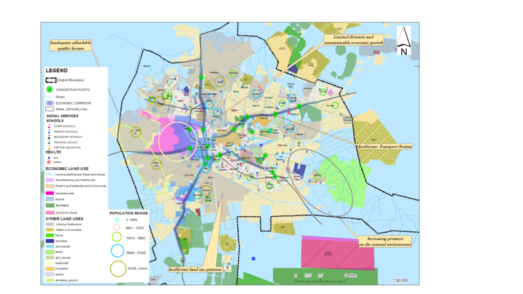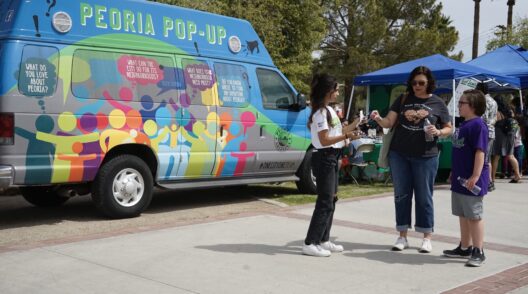Students in LER 460 will create training modules for existing or onboarding new employees. Relevant information will include the definition of a sustainable community, past and present sustainability initiatives of the State College Borough, and details to incorporate these initiatives into employees’ work. Read the final student report delivered to the local gov/community partner. Sustainable […]
Read More… from Human Resources Sustainability Training Modules
Students in ENGL 203, in collaboration with SCP Artist-in-Residence Sarah Nelson, will connect human experiences and climate vulnerability data through story and art. Through library research, ethnographies, artist input, subject interviews, and information from the Metropolitan Council’s Climate Vulnerability Assessment, students will explore climate vulnerability in neighborhoods in the Twin Cities, selected from the localized […]
Read More… from Stories of Climate Vulnerability in the Twin Cities
Providing orange bicycles to be used during the Court Street Connects Festival, recycling receptacles, and outreach to sustainability focused student organizations. Read the final student report delivered to the local gov/community partner. Vital Communities Initiative Contact Info University Faculty Contact Campus Sustainability Local Government / Community Contact […]
Read More… from BGSU Office of Campus Sustainability
It includes a collection of projects that invite people to observe, notice and care for the place. It features a few strategies from social media engagement, to posters, memes, and even a calendar. Read the final student report delivered to the local gov/community partner. Sustainable City Years Program Contact Info University Faculty Contact Estella Porras […]
Read More… from See-Seaside – Media Strategies for Sustainable Living
Identify potential local impacts of climate change in Rosemount, as well as specific strategies to reduce the community’s vulnerability to these impacts, including an education and outreach campaign. Read the final student report delivered to the local gov/community partner. Resilient Communities Project Contact Info University Faculty Contact Carissa Schively Slotterback Public Affairs Local Government / […]
Read More… from Climate Adaptation
Like many other African cities, Lusaka is facing rapid urbanization and various challenges related to inequality, climate change, economic opportunity, and service delivery. The city is faced with limited technical capacity to deliver essential services to all 3.3 million people and with a growth rate of about 5% annually, Lusaka’s Local Authority is unable to […]
Read More… from Lusaka’s Expanding EPIC Partnerships Look to Solve Capacity Issues

Lusaka’s first international EPIC team began training in 2016-2018, and shortly thereafter, they embarked on a series of experimental projects at the University of Zambia on a range of city-wide issues including climate adaptation, pandemic risk-reduction, and city planning. The overarching objective was to ensure the alignment of new EPIC programs with the existing university […]
Read More… from Driving Change in Lusaka: The EPIC Model’s Role in Transforming the City

The City of Peoria, Arizona, is a fast growing scenic suburb of Phoenix. Named the best place to live in Arizona by Money Magazine in 2018 and the best place to live, work and play in Arizona by Ranking Arizona in 2021, the city is well-regarded for its thriving economy and exceptional school districts. Founded […]
Read More… from The City of Peoria achieves sustainability goals with help from ASU students
The City of Glendale, Arizona, may have once been a small farming town, but it has grown into a bustling city home to a diverse population of approximately 250,000 residents. Known as “Arizona’s Antique Capital,” thanks to its many historic buildings, there is nothing old about the city. Glendale houses popular hubs like the Westgate […]
Read More… from The City of Glendale Receives Strategies for Local Sustainability Goals From the Project Cities Program

Though hypermarkets and supermarkets have become the primary source of goods for most Malaysians, many prefer to get their fresh agricultural products from farmers’ and wet markets, like the Alor Gajah Wet Market in the State of Melaka. Each month, the market sends two tons of waste–a third of its total monthly food supply–to a […]
Read More… from Empowering The Wet Market Waste Management Alor Gajah, Melaka, Malaysia


